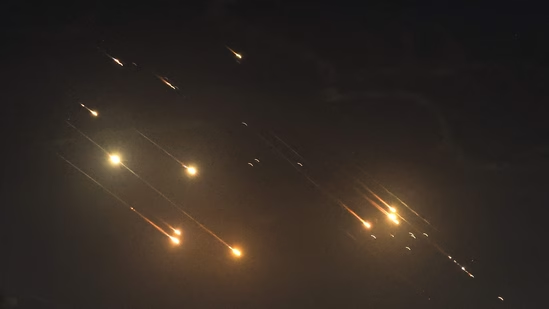Iran justifies its missile attack on Israel, calling it a “legal, rational and legitimate” retaliation for Israeli actions in Lebanon and the assassination of key Hezbollah and Hamas leaders. Learn more about the rising tensions in the Middle East.
Iran’s Missile Strike: A “Legitimate Response” to Israeli Aggression
Tensions in the Middle East reached new heights as Iran launched a significant missile strike against Israel. The Islamic Revolutionary Guard Corps (IRGC) confirmed that Supreme Leader Ali Khamenei made the final decision, supported by Iran’s defense ministry and the Supreme National Security Council (SNSC). The missile attack was described as a direct response to Israel’s military invasion of Lebanon and the recent assassinations of key leaders in Hezbollah and Hamas.
Iran’s president, Masoud Pezeshkian, defended the assault, stating, “This was a decisive response to the Zionist regime’s aggression.” He added that Iran is not seeking conflict but will stand firm against any threats to its national sovereignty. Iranian officials at the UN echoed this sentiment, calling the attack “legal, rational, and legitimate.”
Why Did Iran Attack Israel?
The missile strikes came after the deaths of Hezbollah leader Hassan Nasrallah and Hamas political leader Ismail Haniyeh, both critical figures in Iran’s “axis of resistance” against Israel. Haniyeh was killed in July, and Nasrallah was assassinated just days before the missile attack. Iranian hardliners saw the failure to retaliate for Haniyeh’s death as a strategic mistake, one that emboldened Israeli Prime Minister Benjamin Netanyahu to continue targeting resistance leaders.
Iran’s elite now believes that showing restraint only encouraged further Israeli military action. Hardliners argue that the lack of an immediate response in July allowed Netanyahu to escalate operations against Iranian interests and its allies.

Strategic Shift in Iranian Response
The decision to strike Israel marks a significant shift in Iran’s military strategy. Previously, the administration of former President Ebrahim Raisi had responded swiftly to similar provocations, particularly in April when Iran struck Israeli targets following an attack on its consulate in Damascus.
Current President Pezeshkian, however, took a more cautious approach after Haniyeh’s assassination. Pezeshkian believed that Israel was on the brink of signing a ceasefire deal, leading him to hold off on retaliatory measures. But with no deal materializing, and Netanyahu openly declaring his intention to shift the balance of power in the Middle East, Iran felt cornered and decided to strike back.
Hardline Faction Pushes for Action
This decision reflects growing frustration among Iranian hardliners, who have been pressuring the government for a stronger stance against Israel. Ali Akbar Ahmadian, the chair of the SNSC, declared that Iran was effectively at war with Israel and dismissed Israeli claims of success. Ahmadian claimed Hezbollah’s strength remained intact despite Israeli operations and promised that Hezbollah would enter a “new era” following the missile attack.
While some in Iran are optimistic about the impact of the missile strikes, there is a growing sense of uncertainty. Many experts question whether this will truly deter Israel or lead to further escalation. With both sides prepared for conflict, the future remains uncertain.
Broader Regional Implications
The missile attack not only raises questions about future Israeli-Iranian relations but also highlights the complex alliances in the Middle East. There are reports that neighboring countries like Jordan and Saudi Arabia may have assisted Israel’s defense, as they reportedly did during Iran’s April attack. However, this has yet to be confirmed.
Iran’s actions have also put regional and international actors on edge, with concerns that the conflict could escalate into a larger confrontation. Iran has warned that any retaliation from Israel would be met with further, more severe missile strikes. Meanwhile, Western nations were reportedly notified about the missile launches in advance, further complicating the geopolitical landscape.
What’s Next?
Iran’s missile attack has already altered the dynamics of its confrontation with Israel, and both nations now find themselves at a critical juncture. Netanyahu’s government has not yet responded, but military experts anticipate a counterattack. Iran’s leadership, however, has made it clear that any Israeli retaliation will lead to even more forceful responses.
As both sides prepare for the next phase of this conflict, the region remains on high alert. With Hezbollah pledging continued resistance and Iran’s readiness for further military action, the world will be watching closely to see if this conflict spirals into a larger, more dangerous war.